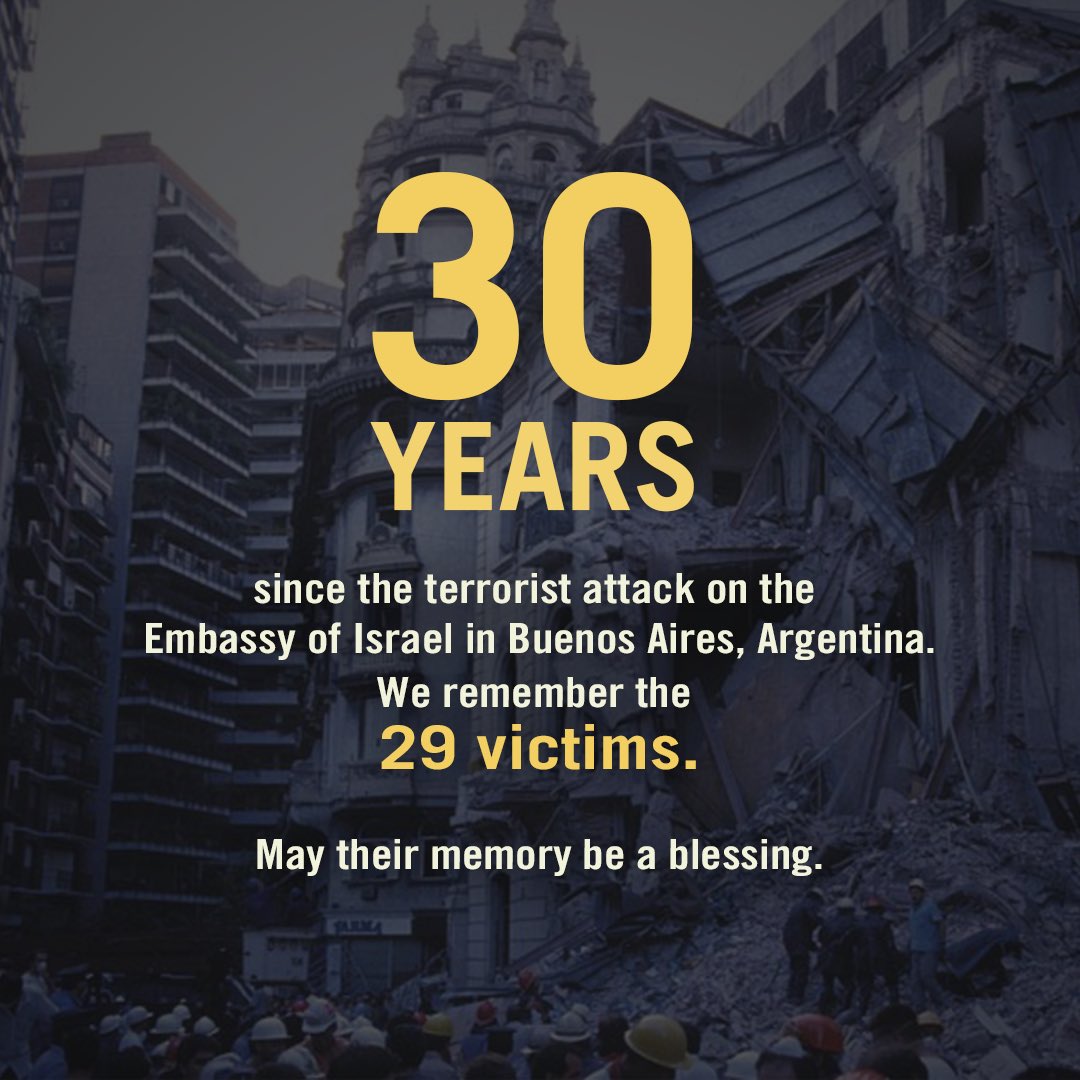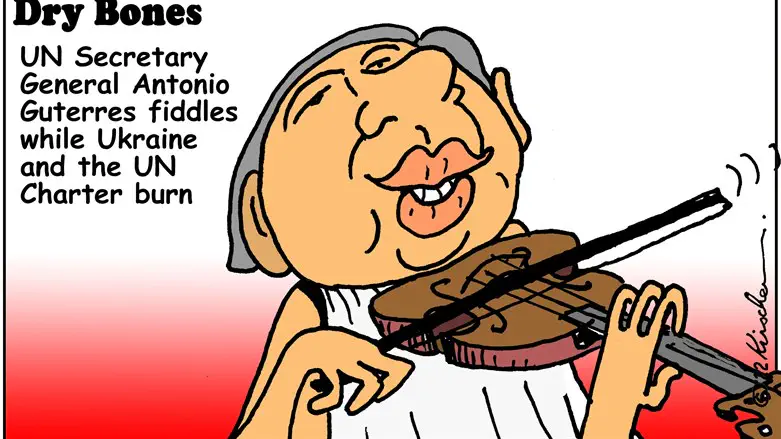Noah Rothman: The Costs of a New Iran Deal Outweigh the Rewards
Anew nuclear deal with Iran, in substance or principle, may be imminent. But the circumstances that would produce such an arrangement ensure that it would not bring peace. It may not even postpone war.Warning against Iran deal, Israel marks 30 years since attack on Argentina embassy
On the night of March 13, a volley of rockets launched from inside Iran rained down on targets in the Iraqi city of Erbil near enough to a U.S. consulate compound that it left no ambiguity about Tehran’s targets. That attack, the Associated Press reports, bolstered arguments both for and against a new nuclear deal. How? “For the administration,” the AP continued, “it confirmed that Iran would be a greater danger if it obtains a nuke.” In other words, Iran must be rewarded for shooting at Americans lest it continue to shoot at Americans. This mindboggling logic tacitly admits that a new nuclear deal is a product of duress; we are deterred by the mere potential of an Iranian bomb.
In the administration’s efforts to keep negotiations over an Iranian program from collapsing, the White House is already sacrificing its relationships with America’s partners in the region. Following the Iranian missile strike, administration officials told New York Times officials that the American facilities that were struck were not, in fact, Tehran’s target. Those officials lent credence to an Iranian narrative that the strike was a response to an Israeli airstrike in Syria in which Iranians operating a secret drone factory were killed. Tehran, the unnamed officials insisted, was actually targeting secret Israeli training facilities inside Iraq.
If that is true, the White House had just revealed the shocking and previously deniable existence of Israeli military facilities inside Iraq. If it isn’t true, it was a repulsively craven display designed to let the White House squeeze out of its obligation to defend U.S. interests from brazen attacks by rogue states. Either way, it was a betrayal of Israel and a display of weakness that will beget future attacks on the symbols of American might in the region.
Dozens of people attended a memorial service Thursday at the site of a 1992 terrorist attack against the Israeli Embassy in Buenos Aires, Argentina, exactly 30 years after the site was blown up by a car bomb.
“It was a terrorist attack against my country, but it was also an attack on Argentina, the country where my father was born and raised,” Justice Minister Gideon Sa’ar, who was leading a Foreign Ministry delegation, said at the ceremony.
The ceremony took place at the same time as the March 17, 1992 attack, when a suicide bomber killed 29 and wounded 242 in front of the Israeli embassy, in what still is the deadliest attack on an Israeli diplomatic mission. A group with ties to Iran and the Lebanese terrorist group Hezbollah took responsibility for the bombing.
“The perpetrator of the attack in Argentina is Iran, and it is our moral duty to continue to pursue them until they are brought to justice,” Sa’ar said.
The justice minister used the ceremony to reiterate Israel’s public position on a potential revival of a nuclear deal between Iran and world powers.
“Recently, we are hearing about the dangerous nuclear agreement, which is being formed between the powers and Iran. The lifting of sanctions under the agreement will transfer huge sums to Iran and its proxies, like Hezbollah, harming peace and stability in the Middle East, and strengthening terror elements,” Sa’ar added.
Before the ceremony, Sa’ar met with the families of those killed and injured in the attack and with the heads of the Jewish community in Argentina.
On Friday, he is slated to meet with Argentine President Alberto Fernández, according to the Ynet news site.
Powerful video reminding that #OTD 30 years ago, #Iran's #Hezbollah terrorists attacked #Israel's Embassy in Buenos Aires, Argentina, killing 29 people. To date, #Iran has still not been held accountable. #huellasdelterrorismo pic.twitter.com/biuefQChu6
— Arsen Ostrovsky (@Ostrov_A) March 17, 2022
‘Extradite Malki’s killer’
FIVE years after the US Federal Bureau of Investigation (FBI) placed Jordanian Ahlam Tamimi on its Most Wanted Terrorists list, Israelis Arnold and Frimet Roth have repeated their calls for Tamimi, who took part in a 2001 Jerusalem bombing that killed their Australian-born daughter Malki, to be brought to justice in the US.
Tamimi helped to plan and took part in the Sbarro pizzeria bombing, in which 15 people were murdered and 130 injured. She was convicted by an Israeli military tribunal and was given multiple life sentences. But she was released in a 2011 prisoner exchange to free Israeli soldier Gilad Shalit, held by Hamas.
However, speaking to The AJN, Arnold Roth pointed out that Israel commuted her sentence on the condition that she would not re-engage in incitement, something she soon openly flouted on returning to Jordan. In that country, she now enjoys celebrity status after hosting an internationally networked 2011-2016 TV talk show, and has trumpeted her lack of remorse over the deadly attack.
“Her unjust freedom – and the injustice it embodies – chokes us,” the Roths jointly stated on the fifth anniversary of the FBI listing.
In 2013, the US Justice Department filed charges against Tamimi based on US nationals who were victims of the Sbarro bombing. Malki was a US citizen through her American-born mother. Four years later, the charges were unsealed (made public) and the US asked for Tamimi’s extradition, but Jordan refused.
Jordan has long claimed its extradition treaty with the US was never ratified, but in late 2020, a freedom-of-information lawsuit by Malki’s parents against the US government yielded a document proving it was ratified, and that there are no legal obstacles to extraditing Tamimi. In fact, other Jordanians wanted in the US have been extradited. Sbarro pizzeria bombing planner Ahlam Tamimi.
Roth has also rejected assertions by Jordan that re-prosecuting Tamimi would breach the US constitutional prohibition on double jeopardy – trying someone for the same crime twice – and explained that this principle does not apply to prosecution in another country.









































